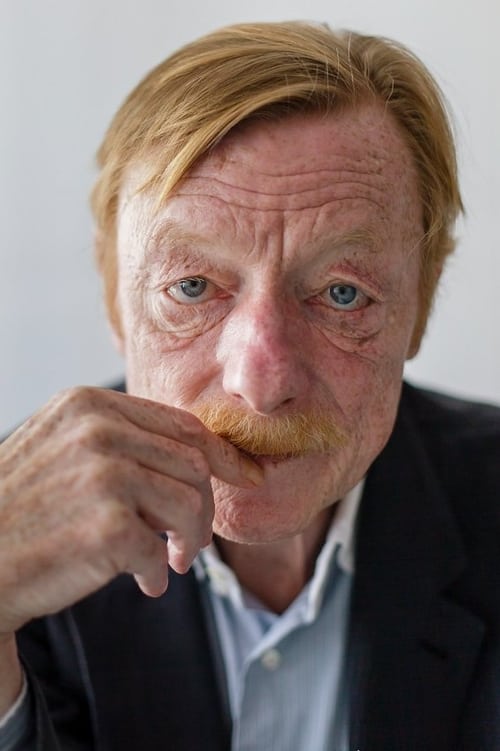Otto Sander (born 30 June 1941 in Hanover) is a German film, theater, and voice actor.
Sander grew up in Kassel, where he graduated in 1961 from the Friedrichgymnasium. After leaving school he spent his military service as a navy reserve officer and then studied theatre science, history of art and philosophy. In 1965 he made his acting debut at the Düsseldorfer chamber plays. After his first film work in the same year he abandoned his studies in 1967, and went to Munich to become a full-time actor.
He is married to the actress Monika Hansen and is stepfather to the actors Ben Becker and Meret Becker.
His career is closely connected with the Schaubühne theatre in Berlin under the direction of Peter Stein. Because of his warm, strong voice, which earned him the sobriquet "The Voice" (the English term is used), he has been used frequently as narrator for television documentaries, and numerous talking books in the 1990s.
In 1990, he was a member of the Jury at the 40th Berlin International Film Festival.[1]
Among his best-known film roles are the angel Cassiel in Wings of Desire and its sequel Faraway, So Close! by Wim Wenders, and a shell-shocked U-boat commander, Kapitänleutnant Philipp Thomsen, in Wolfgang Petersen's Das Boot. Sander also appeared in Comedian Harmonists, a biopic about the musical group of the same name. He has two brothers, the lawyer Adolf Sander, the scientist Christian (Chris) Sander, and a sister, the book dealer Marianne Sander. He also played a professor in the movie: The Promise about the division of Berlin by the wall.
Description above from the Wikipedia article Otto Sander, licensed under CC-BY-SA, full list of contributors on Wikipedia.
To the INFP personality types life is a long quest for meaning and harmony and their personal values are so important to them. This means that it is essential to the INFP that their beliefs and their actions are totally in sync at all times. An INFP is unlikely to take any action which they don’t believe in their heart is right. Yet there is a crusading side to the INFP which would surprise even those who knew the person well. When a personal value, or belief is trodden on, then the INFP can become outspoken and turn on the transgressor. They are so private that their values are usually well hidden so that other people may not realise, but the INFP becomes like a champion of the cause and will be expressive, animated and at times go for the jugular.
The INFP has two contrary characteristics, curiosity and shyness. They love to know what's going on, feel excluded if not kept informed but prefer to be more in the background and not wanting to be the centre of attention. The INFP always wants to be invited to the party - even though the chances are they won't show up. There is a sensitive, caring side to the INFP which means they will be see the interconnections between people and pick up on the verbal and non-verbal cues.
Sensitive, caring and empathetic INFPs are excellent in supporting roles where people have to be looked after - especially if those people are close to the INFP. Because it can take so long (if ever) to get to know the INFP, others paradoxically may see them as slightly aloof, as they engage best when they have allowed someone into their inner sanctum. Optimistic and extremely positive, INFPs are the ultimate dreamers. Forward thinking and focused, they love the possibilities that life might bring.
An INFP does not like to be categorised. They value their autonomy, and feel 'different,' and any system, (including this one), which tries to 'define' or 'explain' them would be denigrated. The INFP would say, 'You can't put me in a box, I'm different,' indeed they would all say this. Optimistic and extremely positive, INFPs are the ultimate dreamers. Forward thinking and focused, they love the possibilities that life might bring. INFPs are extremely future oriented individuals who enjoy flights of fancy and savour potential and the many possibilities unlike their ISFP counterparts, who prefer to stop and savour the sensory, real experiences of “this moment” to the maximum. The ISFP will look down, immersing themselves in actual experiences whilst the INFP will always look up and forward, dreaming big dreams and loving the anticipation of what might come.
INFPs have the ability to see good in almost anyone or anything. Even for the most unlovable individual the INFP can have (often misplaced) empathy and even pity. Their extreme depth of feeling is often hidden, even from themselves, until circumstances see them project a seemingly uncharacteristic impassioned, and extraverted, response. Of course, life is not always harmonious, so INFPs are not immune from all of life’s problems, frustrations and disappointments that we all face.
However, they feel a duty to a higher calling, the greater good. So, although essentially idealists and extremely gentle individuals, INFPs, when their values are contravened, can adopt a more strident, crusading ESTJ type of role, to sort things out, which will surprise even close friends who have only seen the gentle, quiet soul. But then, once they’ve made their point, their energies will be depleted, and they will disappear back to their own, quiet, introverted world of possibilities and harmony, often questioning whether they should have been so harsh and worried that they haven’t either shown too much of themselves (always a concern for the extremely private INFP) or, worse still, that they might have caused hurt to someone, which is never their intention.
Choose another celebrity type to compare side by side the different approaches work, attitudes to conflict and the way they engage with others.
